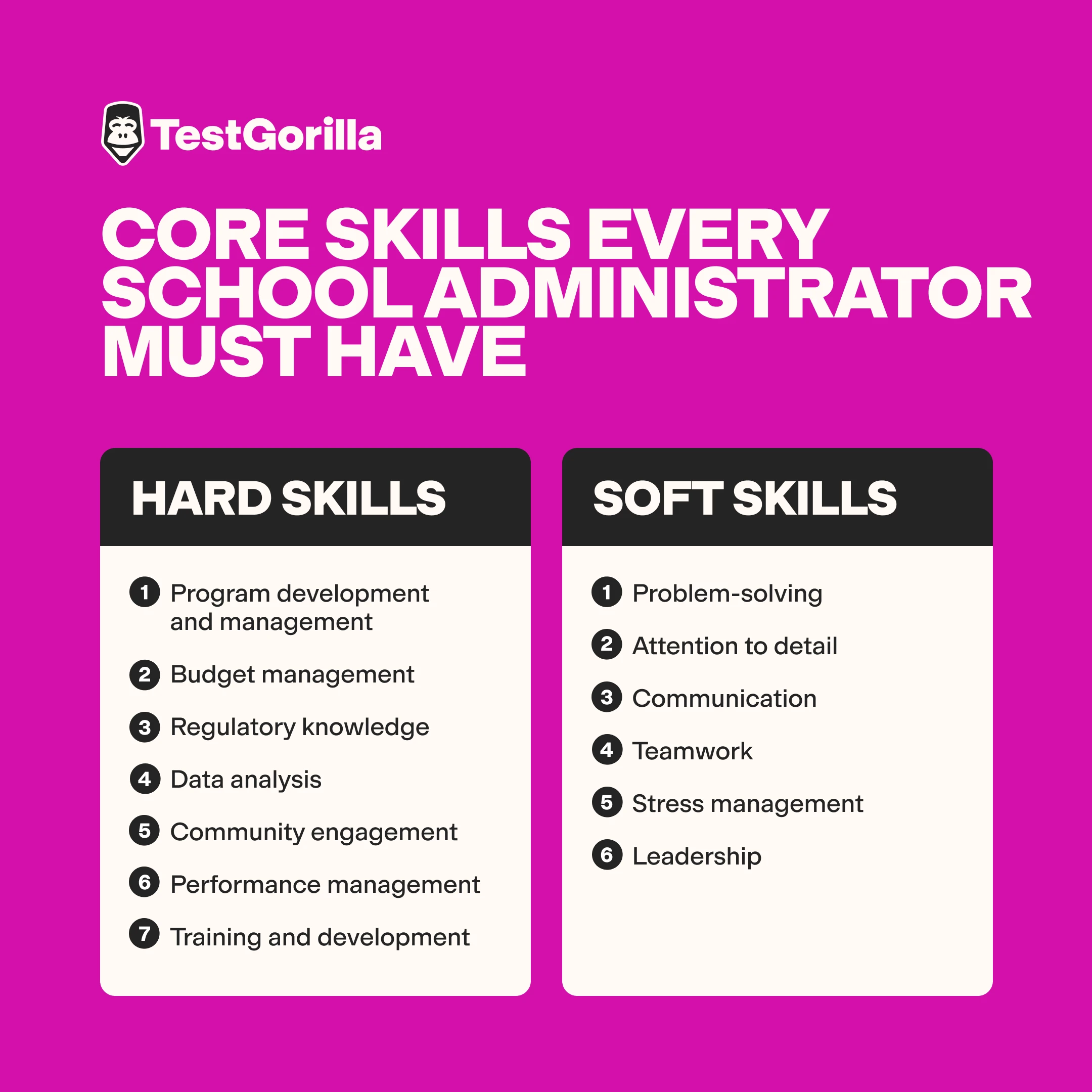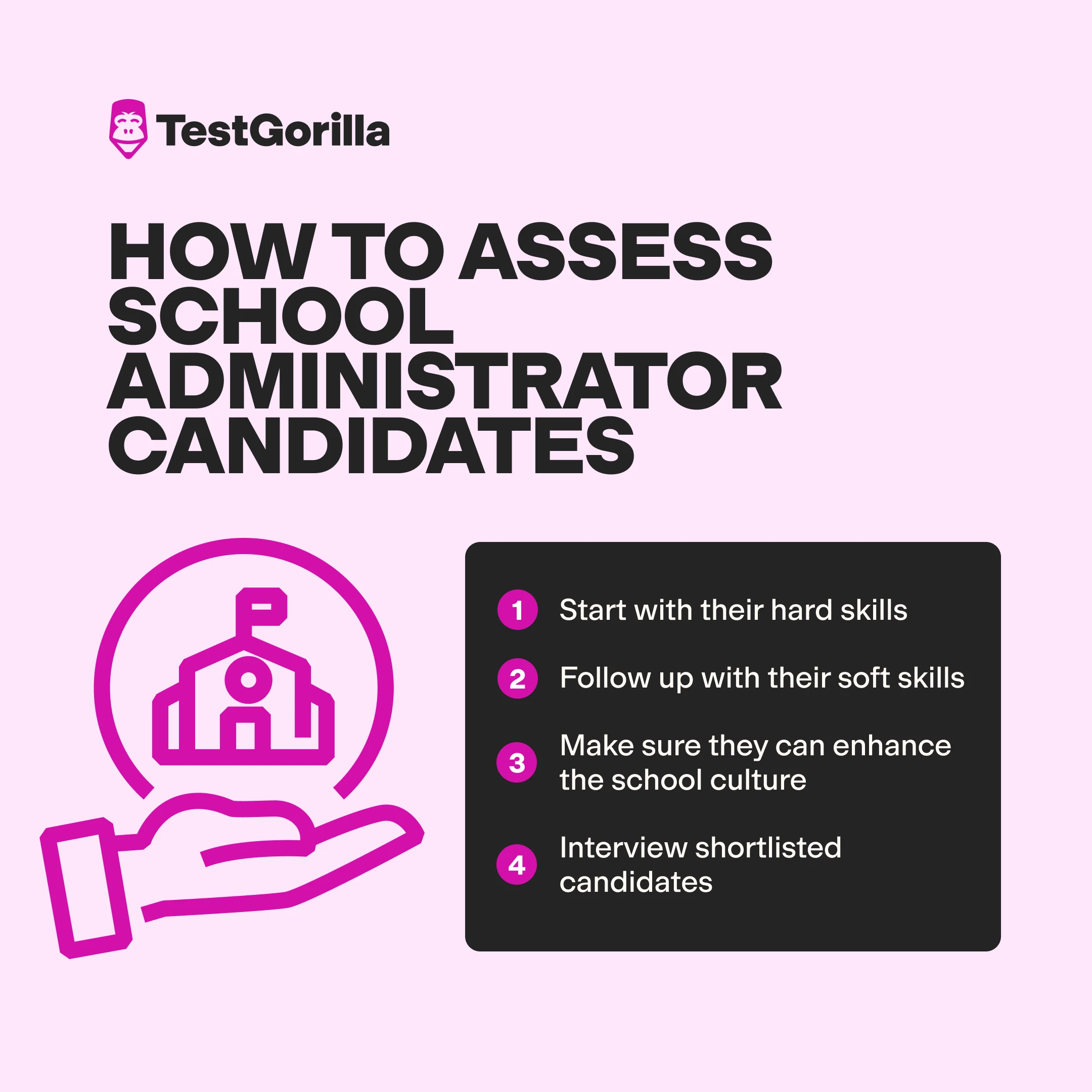The first step to creating an environment where students and teachers can thrive is choosing the right school administrator. But finding the right person for the job is tough because they need the right combo of skills to keep the school running smoothly.
Not sure which skills we're talking about? Then you might end up with someone who’s not quite up to snuff. As a result, your school might face some real headaches – like disorganized programs, unhappy parents and teachers, or students without the resources they need. Don’t stress, though! Our guide can help. We walk you through the skills every school administrator needs and show you how to use talent assessments to check if your candidates really have them. Keep reading to find out how to spot the pros who’ll make your school shine.
What is a school administrator?
A school administrator is an educational leader who makes sure the school runs smoothly, keeps educational standards high, and uses resources wisely to support student learning. They create a positive and productive environment for students, staff, and the community.
Each day, school administrators check on operations, update educational programs, and manage school resources. They might review lesson plans, train staff as needed, and quickly handle any issues that come up.
They work with teachers, parents, and others to improve the school's atmosphere. They update rules, make the school engaging and safe, and even sometimes advise on new teaching methods.
In addition to handling daily activities, they make sure the school follows all educational laws and standards.
School administrators are essential in any educational setting – from primary schools to universities.
Core skills every school administrator must have
A school administrator needs a combination of HR and educational skills to run your school effectively and keep the environment positive. Here's a rundown of the essential hard and soft skills needed for anyone looking to succeed in this role.
Hard skills
These hard skills help your school administrator manage and improve the quality of education at your school:
Program development and management for understanding how to create and adjust school curricula and programs to meet your school’s learning and teaching goals
Budget management for managing finances when managing payroll or distributing funds across your school programs
Regulatory knowledge – such as the Every Student Succeeds Act – to make sure your school complies with state regulations, federal educational requirements, and more
Data analysis for using educational data – like performance metrics and student feedback – when making decisions to improve student performance
Community engagement to build strong relationships and partnerships with the community – including parents and local businesses
Performance management to fairly evaluate staff performance
Training and development to improve staff performance, support growth, adapt to changes, and more
Soft skills
Your school administrator should also have the following soft skills:
Problem-solving to address any educational challenges and administrative issues when they come up
Attention to detail for monitoring educational processes and student performance
Communication so they can clearly explain educational policies and decisions to teachers, parents, and students
Teamwork for collaborating effectively with teachers, other staff, parents, and more to improve the school
Stress management to keep it together when making tough decisions concerning school-related incidents
Leadership to guide and motivate teams in achieving great educational results and keeping things running smoothly – even when things get tough
The best insights on HR and recruitment, delivered to your inbox.
Biweekly updates. No spam. Unsubscribe any time.
How to assess school administrator candidates
Since school administrators need both HR and educational skills, you must be sure you’re looking at both of these when assessing candidates. You might consider using tests suitable for teachers – along with tests that assess the additional skills an administrator needs to lead your institution’s operations successfully.
TestGorilla is a talent discovery platform that can simplify this process for you. We have various tests to help you identify candidates who have all the necessary skills and qualities for your roles.
With our platform, you can create custom talent assessments by combining up to five tests. You can even include your own questions.
Here’s how you might approach this assessment for school administrators.
Start with their hard skills
To evaluate the hard skills of school administrator candidates, you might use these tests:
Performance Management test: This test shows you if a candidate can evaluate performance fairly, give meaningful feedback, and more. It can help you figure out how well a candidate will manage teacher performance.
Training and Development test: This test shows if candidates can create and implement training and development programs. You can use it to see how well they’ll do when carrying out these programs for school staff members.
Program Management test: This test helps you check how well candidates can manage programs, resources, and stakeholders. It can clue you in to their effectiveness at managing school programs.
Budget Management test: This test assesses candidates' skills in managing finances – from controlling budgets to estimating needed resources. Use the test to see how well candidates can handle the school’s budget.
Data Analytics in Excel test: This test evaluates how well candidates can interpret and use data using the spreadsheet program Excel. This test is great if your school uses Excel, and it can help you check how well your candidates can use the program to examine data and improve school performance and student results.
Follow up with their soft skills
To assess your candidates’ soft skills, you might use these tests:
Problem Solving test: This tells you how effectively they can spot problems and come up with practical solutions.
Communication Skills test: This test helps you see how clearly candidates can communicate complex information to different audiences.
Critical Thinking test: This one tells you how they reason and make decisions after examining a situation.
Attention to Detail test: This test shows you how well candidates can pay attention to text as they’re processing information.
Leadership & People Management test: This one checks how well they can support others, delegate tasks, provide feedback, and more.
Personality tests: Tests like the Big 5, the 16 Types, or the Enneagram tell you more about candidates’ work preferences, motivations, communication styles, and more.
Make sure they can enhance the school culture
School administrators work closely with teachers, other staff, parents, and the community to create a positive educational environment. It's important that they fit into and enrich the school culture.
Our Culture Add test can help you glimpse your candidates’ values and behaviors. This way, you choose someone who will mesh well with your team and bring something new to the table that can “add” to your institution’s current educational practices.
Finally, interview shortlisted candidates
Tests don’t always provide all the information you need to know about a candidate’s skills or qualities. Interviews can help you find those missing pieces so you can better understand your top candidates.
For example, to understand how a candidate handles teamwork and leadership, consider asking:
Can you describe a situation where you had to collaborate with teachers, parents, and other stakeholders to address a complex issue at your school? What strategies did you use to make sure everyone was on the same page?
This question digs into the candidate's practical experience in handling real-world leadership and teamwork situations in a school setting.
2 mistakes to avoid when assessing school administrator candidates
These two mistakes might land you a school administrator who isn't right for your educational environment.
1. Not testing their conflict resolution skills
From fighting students to upset staff or parents, conflicts happen daily at school. How your school administrator handles these conflicts can really affect the school's atmosphere. If you don't check a candidate's conflict resolution skills, you might end up with even more clashes and tension in your school community.
For example, if an administrator can’t resolve a dispute between departments over resources, it could lead to ongoing friction that disrupts your students’ learning.
2. Overlooking community involvement
A school administrator at Barksdale Elementary in Texas said, “The impact of parental involvement on a student’s success is one of the most important aspects of a child’s education. Building a strong relationship between the school system and parents is extremely vital.”
School administrators need to actively connect with parents, organizations, and local leaders. Building these relationships improves the school's role and reputation in the community – and improves student success.
If you don't check a candidate's past community engagement, you risk hiring someone who handles internal tasks well but weakens your school’s community ties.
For example, an administrator who doesn’t seek local business sponsorships or community-based learning opportunities could miss out on valuable resources and community support. Meanwhile, one who fails to get parents involved in their kiddos’ schooling will miss opportunities to improve those kids’ academic success.
FAQs
Who is usually the school administrator?
Usually, the school administrator is someone in a leadership position – such as the principal or vice principal. At larger educational institutions, this role can also include other managerial roles – like department heads or directors of specific programs (e.g., the Director of Student Services).
What is the role of an administrator in a school?
A school administrator oversees the daily operations and plans for a school’s future. Their job functions include managing staff, setting educational goals, making sure the curricula meet educational standards, handling budgets, and keeping the school safe.
Snag your next school administrator using TestGorilla
Finding the right school administrator is a must for making sure your school operates at its best. They need a solid mix of skills – from program management to leadership – to keep your school environment positive and progressive.
If you end up hiring someone who's missing these essential skills, your school could face disorganization, lowered educational outcomes, and unhappy community members.
TestGorilla offers user-friendly assessments to check these skills so you can choose the best person to lead your school.
Interested in enhancing your hiring process? Explore the 400+ tests in our test library, book a demo, or sign up for a free account to get started today.
You've scrolled this far
Why not try TestGorilla for free, and see what happens when you put skills first.
















